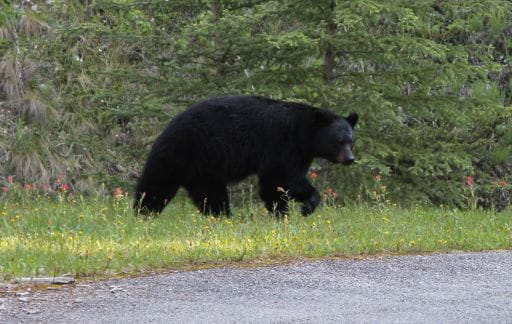Released on June 22, 2021
With camping season upon us, it is important to be bear aware and keep campsites and other areas free of attractants. Many of Saskatchewan's parks and campgrounds are in bear country and bears have been known to wander through on occasion. Proper food storage, cooking methods and garbage handling are essential for safe camping in bear country.
"It's important to remember that these are wild animals and they can be unpredictable and sometimes dangerous," Ministry of Environment Wildlife Biologist Matthew Tokaruk said. "Take the necessary safety precautions in areas where there may be a higher chance of encountering bears or other predatory animals."
When bears start to associate food sources with humans, they become a public safety risk.

If you encounter a bear, keep your distance and do not try to scare the animal away or handle the situation yourself. Most often, animals will move on without any intervention.
In a campground:
- Never cook or eat in your tent.
- Never store food in tents or tent trailers. Store food in air-tight containers in the trunk of your vehicle.
- Place all garbage in the containers provided. Do not burn or bury scraps.
- Clean fish only at designated fish-cleaning stations.
- Keep your pet on a leash.
- Keep young children close at hand, especially at dawn and dusk.
- Use a flashlight at night.
If a bear enters the campground:
- Stay calm. Do not run.
- Do not harass or chase the bear.
- If the bear is at a distance, calmly place all food in your vehicle.
- Get into your vehicle and report the incident to staff.
"Never feed bears or leave food for a bear - it is illegal and you will invite trouble for yourself, other campers and the bear," Tokaruk explained. "Bears that have been fed by people, lose their natural fear of humans, and often have to be destroyed."
New regulations prohibit the feeding of bears, wolves, cougars and coyotes. This regulation was put in place to help alleviate increased concerns related to dangerous wildlife gaining access to human sourced foods. This includes feeding these animals on the side of the road.
Failure to manage food and garbage while camping may result in fines under the amended regulations.
This prohibition does not apply to the use of bait for licensed hunting or trapping purposes, conducting agricultural activities or operating licensed landfills.
If you have an encounter with an aggressive bear, and/or if public safety is at risk, call the Turn in Poachers and Polluters (TIPP) line at 1-800-667-7561 or from your SaskTel cell phone at #5555.
To report concerns about nuisance bear(s), contact the ministry's general inquiry line at 1-800-567-4224 or by email at centre.inquiry@gov.sk.ca.
Additional information about bears and bear safety is available at www.saskatchewan.ca/wildlife-issues.
-30-
For public inquires, contact:
Inquiry Centre
Environment
Phone: 1-800-567-4224
Email: centre.inquiry@gov.sk.ca
For media inquiries, contact:
Val Nicholson
Environment
Prince Albert
Phone: 306-953-2459
Email: Val.Nicholson@gov.sk.ca

